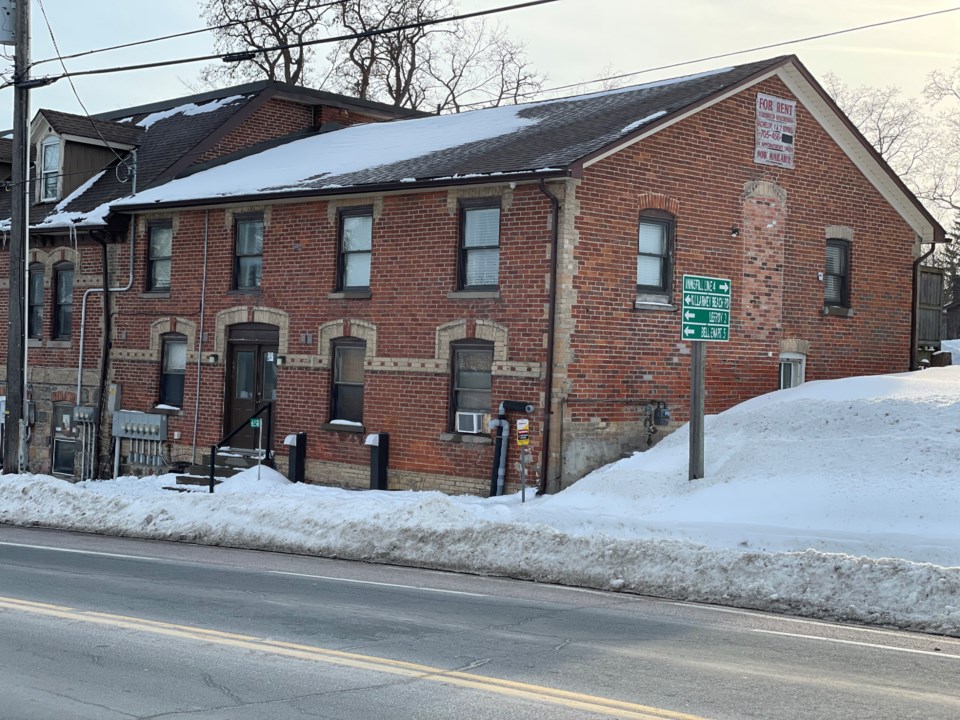An infamous relic of Churchill’s past could soon be designated under the Ontario Heritage Act.
Innisfil’s Heritage Committee requested council declare its intent to designate the building at 6276 Yonge St. The former Waterloo Inn currently houses apartments. It stands next door to the former Churchill Store, itself a designated property.
The two properties have the same owner. Before approving the resolution, Mayor Lynn Dollin wanted to ensure they weren’t going to be caught off guard.
“It looked like there was no representation from that particular property and I just wondered if they had been advised,” Dollin asked. “Did they know this was coming forward (and) whether or not next week we’re going to hear they had no idea this was happening?”
Assistant Clerk Kevin Jacob confirmed the property owners were advised and invited to attend the Feb. 3 Heritage Advisory Committee meeting.
Jacob also indicated there is no effort on the town’s part to confirm the notice was received, however, a letter would be sent to a property owner about a month to a month-and-a-half in advance.
The Waterloo Inn is a landmark in the village, the Heritage Committee argued, and its history and design make it worthy of designation
Tales of the Waterloo Inn date back to the 1840s, with the current structure purported to be constructed around 1869. In the potentially more than 175 years at the centre of Churchill, the building has been the local hangout for the rough and rowdy transient workers from nearby sawmills, a community meeting place, and home to different entrepreneurs and their businesses.
Many families influential in the development of Innisfil have been involved in the attached store and inn throughout the years, including the Sloans, Lucases and Allans.
“Whether as an inn, gathering place, home-based business or dwelling, this structure has seen it all and offers insight into the development of Innisfil,” the committee’s report stated.
There are two periods when property owners can formally object to a heritage designation, Jacob explained. The first is in the 30 days following council declaring its intent to designate. If an objection is submitted, council then has 90 days to decide to move forward with the designation process or withdraw its intent. The second opportunity for objection is within 30 days of the heritage designation bylaw being passed by council. The final decision on the matter would then rest with the Ontario Land Tribunal.
Another potential heritage designation was at the forefront of another item on council’s agenda Wednesday.
Council also approved a deadline extension for several properties in Cookstown to secure sanitary sewer allocation, including 34 King St. S. While council did not debate the contents of the report, Dollin wanted to provide some additional information to residents watching the meeting concerned about the property and the future of Ravenscraig, the heritage home that currently resides there.
“It wasn’t captured in the original Heritage Conversation District because there were quite a few non-contributing homes between where the district ends and where Ravenscraig was,” Dollin explained. “But that doesn’t diminish the importance of that one building to the village.”
In 2017, council approved a draft plan and rezoning of 34 King St. S., allowing for the development of 11 townhouses and seven single detached lots, with one including Ravenscraig.
Dollin was concerned that if the extension of 18 months was granted, in that time the current owners or a new owner could argue the building isn’t able to be saved.
Town staff indicated that isn’t likely to happen.
“The applicants have submitted site plan application, entered into a Heritage Preservation Agreement with the town in September 2021 and has obtained approval of urban design guidelines,” a staff report indicated. “Together these will ensure restoration and long-term protection (via a heritage designation) of the historic structure and ensure new housing is designed to be compatible with the significant heritage attributes of Ravenscraig.”
The Cookstown Sanitary Sewer Allocation Policy has been in effect since 2012. It limits sanitary allocation to ensure new development in the village does not exceed the capacity of the Cookstown Wastewater Treatment Plant.



